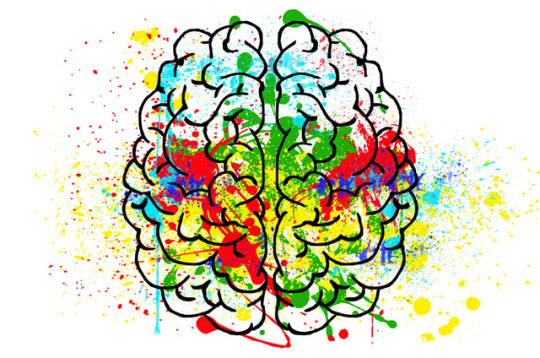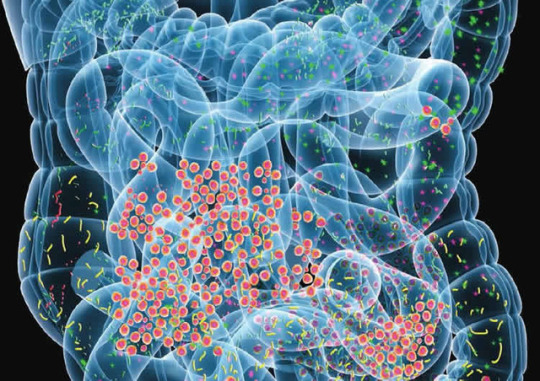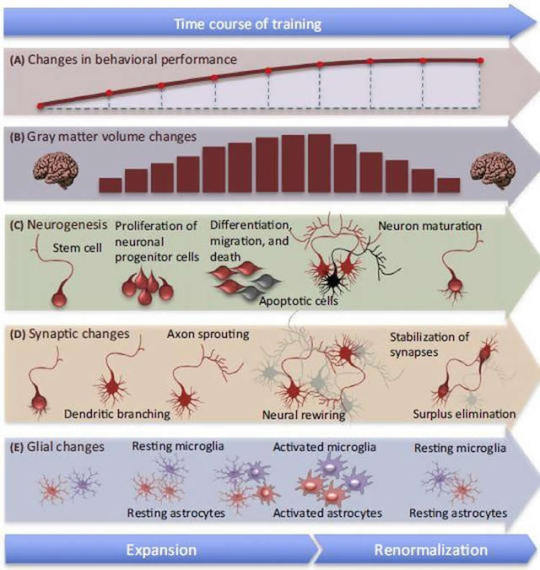Primary Care docs x Hospitalists...
Study: For Inpatients, Primary Care Docs Outperform Hospitalists A closer look at data showing lower mortality when patients cared for by their own PCPs
Neurons connections
Mapping connections of single neurons using a holographic light beam November 13, 2017 [image: The researchers used an opsin protein called CoChR, which generates a very strong electric current in response to light, and fused it to a small protein that directs the opsin into the cell bodies of neurons and away from axons and dendrites, which extend from the neuron body, forming “somatic channelrhodopsin” (soCoChR). This new opsin enabled photostimulation of individual cells in mouse cortical brain slices with single-cell resolution and with less than 1 millisecond temporal (time) pre... mais »
Digital technology
Nearly every job is becoming more digital — Brookings study November 15, 2017 [image: The shares of U.S. jobs that require substantial digital knowledge rose rapidly between 2002 and 2016 --- mostly due to large changes in the digital content of existing occupations. (source: Brookings analysis of O*Net, OES, and Moody's data)] "Not everybody needs to go to a coding boot camp but they probably do need to know Excel" Digital technology is disrupting the American workforce, but in vastly uneven ways, according to a new analysis of 545 occupations in a report published today by the Br... mais »
blood-brain-barrier
How to open the blood-brain-barrier with precision for safer drug delivery November 17, 2017 [image: controlled ultrasound ... ft] Researchers at Brigham and Women’s Hospital have developed a safer way to use focused ultrasound to temporarily open the blood-brain barrier to allow for delivering vital drugs for treating glioma brain tumors — an alternative to invasive incision or radiation.* Focused ultrasound drug delivery to the brain uses “cavitation” — cre
multinutrient prodromal Alzheimer's disease
24-month intervention with a specific multinutrient in people with prodromal Alzheimer's disease (LipiDiDiet): a randomised, double-blind, controlled trial Prof Hilkka Soininen, PhD[image: ']Correspondence information about the author Prof Hilkka SoininenEmail the author Prof Hilkka Soininen , Alina Solomon, PhD , Pieter Jelle Visser, PhD , Suzanne B Hendrix, PhD , Kaj Blennow, PhD , Prof Miia Kivipelto, PhD , Prof Tobias Hartmann, PhD on behalf of the [image: show] LipiDiDiet clinical study group† †Study group members listed in the appendix Published: 30 October 2017 Open Acce... mais »
SBC: Posse diretoria 2018-19
[image: Convite Solenidade de Posse] [image: Convite Solenidade de Posse][image: Convite Solenidade de Posse]
Auguste Rodin
[image: The Kiss, marble sculpture by Auguste Rodin, 1886; in the Rodin …] Auguste Rodin French sculptor Auguste Rodin, known for his bronze and marble figures, including *The Thinker* (1880) and *The Kiss* (1886), and considered one of the best portraitists in the history of sculpture, died this day in 1917.
Biohackers
*Enviado pela AMICOR Maria Inês Reinert Azambuja, com o comentário A Realidade sempre consegue superar a ficção...* Biohackers are using CRISPR on their DNA and we can’t stop it People are starting to alter their own DNA with cheap, easy gene-editing technology. Is it time to regulate CRISPR? [image: Josiah Zayner] Josiah Zayner has edited his DNA The ODIN Inc. By Alex Pearlman GENE editing is entering the mainstream. CRISPR, a cheap and easy technique for making precise changes to DNA, has got researchers around the world racing to trial its use in treating a host of human... mais »
Urban evolution
Urban evolution Today more than 80% of Americans live in cities. The draws of the metropolis seem clear: entertainment, excitement, and opportunity. Of course, city life can also change you in not-so-desirable ways. Urban living has been associated asthma, allergies, depression, and anxiety. But what about the non-human city dwellers – the bugs and beasties lurking in our metropolitan interstices? How is the hustle and bustle of urban life affecting them? Get the whole story here.
Nanowired drugs
Nanowired Drugs Could Treat Alzheimer’s and Parkinson’s Patientsby Neuroscience News Using titanate nanowires treated with cerebrolysin, researchers have been able to target delivery to the brain and through the central nervous system. Researchers report the use of nanowires to deliver drugs could be beneficial in the treatment of Alzheimer's, Parkinson's and other neurodegenerative diseases. Read more of this post *Neuroscience News* | November 16, 2017 at 9:12 am | Tags: cerebrolysin, nanowires, titanate, University of Arkansas | URL: https://wp.me/p4sXNK-bGV Comment See all com... mais »
BP Guidelines...
OPINION | OP-ED CONTRIBUTORDon't Let New Blood Pressure Guidelines Raise YoursBy H. GILBERT WELCH A national goal of 130 systolic may lead many patients to be overmedicated.
Arts Reward
neurosciencestuff Making Art Activates Brain’s Reward Pathway Your brain’s reward pathways become active during art-making activities like doodling, according to a new Drexel University study. Girija Kaimal, EdD, assistant professor in the College of Nursing and Health Professions, led a team that used fNIRS (functional near-infrared spectroscopy) technology to measure blood flow in the areas of the brain related to rewards while study participants completed a variety of art-making projects.
Gut Bacteria
neurosciencenews How Gut Bacteria Influences Neurodegenerative Disorders Humans have roughly as many bacterial cells in their bodies as human cells, and most of those bacteria live in the gut. New research released today reveals links between the gut microbiome – the population of microorganisms living in the gastrointestinal tract – and brain diseases such as Parkinson’s and Alzheimer’s, including potential new ways to track and treat these diseases. #neuroscience #science #neurology #microbiome #microbiota#gut bacteria #alzheimers #parkinsons
Learning
1. 2. neurosciencenews Brain Auditions Different Cells When Learning a Task, Some Don’t Make the Cut For decades, neuroscientists have wondered how the brain can continue to learn new skills without needing to grow in size or volume over a person’s lifetime. Evidence suggests that the number of brain cells - such as neurons and glial cells - does initially increase as we’re learning, but many are eventually pruned away or assigned to other roles. The research is in *Trends in Cognitive Sciences*. (full open access) #learning #neuroscience #science... mais »
Thalamus: learning function
1. 12 notes 2. neurosciencenews The Thalamus Helps the Cerebrum With Learning The cerebral cortex is where we learn and think, form impressions of our environment, control conscious behaviour, and store memories. According to the textbooks, the upstream regions of the brain like the thalamus only contribute to these processes by forwarding information from the sensory organs to the corresponding regions of the cerebral cortex and filtering the information, if necessary. The research is in *Nature Neuroscience.* (full access paywall)... mais »
AD: Synapse loss
neurosciencenews Drug Could Derail Synapse Loss in Alzheimer’s A recent multi-centre study, led by King’s College London and the University of Manchester, has established that synapse loss in Alzheimer’s disease is driven by a specific signalling pathway. This pathway is called the Wnt-planar cell polarity (PCP) signalling pathway and it may be pivotal to the progressive neurodegeneration seen in the disease. The research is in *Alzheimer’s & Dementia*. (full open access) #neurology#neuroscience#science#alzheimers
Terra: 20 anos de mudança
20 anos de mudanças na Terra vistas do espaço Não é só para pesquisar o que acontece no espaço que os satélites da NASA estão na nossa atmosfera. Há 20 anos, a agência espacial americana observa continuamente as propriedades físicas do nosso planeta e a vida que o torna – pelo menos por enquanto – único no universo. Os satélites analisam a vida terrestre e oceânica diretamente do espaço desde a década de 1970, mas somente com o lançamento do Sea-view Wide Field-of-View Sensor (SeaWiFS), em 1997, que a agência espacial começou uma visão contínua e global da vida terrestre e oceânica. A... mais »
3-D Brain
Take a Fantastic 3-D Voyage Through the Brain with New Immersive Virtual Reality Systemby Neuroscience News Researchers will unveil a new immersive VR system that allows users a unique way to interact with 3D anatomical brain data at Neuroscience 2017. Read more of this post [image: brain slices] This 2-D brain image captured with a lightsheet microscope is representative of the type of data the VR system can explore in more detail. It shows a mouse brain injected with a fluorescent retrograde virus in the brain stem to reveal labelling of multiple brain wide projections. Neuroscienc... mais »
Thalamus
The Thalamus Helps the Cerebrum With Learningby Neuroscience News New findings from Max Plank Institute researchers challenges conventional belief about the role of the thalamus in learning. Researchers report the thalamus plays a far more active role in visual processing in the context of learning than previously thought. Read more of this post *Neuroscience News* | November 15, 2017 at 8:12 am | Tags: dLGN, dorsal lateral geniculate nucleus, strabusmus | URL: https://wp.me/p4sXNK-bGj Comment See all comments
NYAS 2 centuries, imagining the next...
[image: The New York Academy of Sciences Logo] [image: Imagining the Next 100 Years of Science and Technology] Imagining the Next 100 years of Science and Technology As the New York Academy of Sciences approaches its third century, we started thinking about the scientific discoveries that might be made in the next 100 years. Then it occurred to us — the New York Academy of Sciences has the World's Smartest Network™, why not put the question to our Members? So we invited some of our most extraordinary young and senior scientist Members, to offer their thoughts about what they believe co... mais »
NYAS 2 centuries, imagining the next...
Imagining the Next 100 Years of Science and Technology [image: Imagining the Next 100 Years of Science and Technology] As the New York Academy of Sciences approaches its third century, we started thinking about the scientific discoveries that might be made in the next 100 years. Then it occurred to us — the New York Academy of Sciences has the World's Smartest Network™, why not put the question to our Members? So we invited some of our most extraordinary young and senior scientist Members, to offer their thoughts about what they believe could be the next generation of discoveries or t... mais »
Maria Luiza Niederauer Laydner - 186 anos
Esta postagem é feita em memória de Maria Luiza Niederauer Laydner, minha bisavó materna, cujo nascimento ocorreu há 186 anos, neste dia 14 de novembro. Maria Luiza Niederauer Laydner Seus pais, Philipp Leonhard Niederauer e Anna Catharina Diehl, naturais do Rheinhessen, chegaram à Colônia Alemã de São Leopoldo, em 15 de janeiro de 1826. Do Rio de Janeiro a Porto Alegre, foram transportados pelo bergantim *Carolina*, um veleiro de dois mastros, “marcado pela fome e pela morte”. *Três Forquilhas* O casal estava entre os pioneiros da Colônia Alemã de Três Forquilhas, em setembro de 182...mais »
Inclusion Health
Important papers just out in the Lancet: Begin forwarded message: *From: *Alex Bax *Subject: **Inclusion Health research in The Lancet* *Date: *November 12, 2017 at 2:30:56 PM EST *To: *unlisted-recipients:; (no To-header on input) Dear Colleague This is just to draw your attention to the two significant papers on Inclusion Health published in The Lancet today, and the guest editorial from Professor Sir Michael Marmot. The papers are the result of five years work and wide international collaborations brought together by Pathway and the Faculty for Homeless...mais »
Quantum computer
SCIENCE TICKER Quantum computers take a step forward with a 50-qubit prototype NOV 10, 2017 08:11 AM Race to build ever-more-powerful processors edges the technology closer to being able to best traditional machines. Read More
Medical evidences
CONTEXT Philosophical critique exposes flaws in medical evidence hierarchies NOV 13, 2017 01:11 PM Rankings of research methods for validity of medical evidence suffer from logical flaws, an in-depth philosophical critique concludes. Read More Immanuel Kant was famous for writing critiques. He earned his status as the premier philosopher of modern times with such works as *Critique of Pure Reason*, *Critique of Practical Reason* and *Critique of Judgment*. It might have been helpful for medical science if he had also written a critique of evidence.
HYPERTENSION
NEWS New blood pressure guidelines put half of U.S. adults in unhealthy range NOV 13, 2017 06:11 PM New hypertension guidelines broaden the range of those considered to have high blood pressure and emphasize lifestyle changes to combat the condition. Read More
Coffee
Another Major Reason to Feel Good About Drinking CoffeeKeep that morning joe: drinking coffee is linked to a lower risk of heart failure, stroke and heart disease in a new study By Amanda MacMillan November 13, 2017 TIME Health For more, visit TIME Health. The news about coffee just keeps getting better. In a new analysis of one of the country’s largest and longest-running studies, drinking coffee was linked to a lower risk of heart failure, stroke and coronary heart disease. Every extra cup of coffee consumed per day reduced each of these conditions by 8%, 7% and 5%, respectively... mais »
Alzheimer's Disease
All articles are *freely available online until 30th November 2017.* [image: Wiley] [image: Alzheimer's Disease Awareness Month Essential Reading] *Explore the latest Alzheimer’s disease research* November is Alzheimer’s Disease Awareness Month, a month which aims to raise awareness and challenge the stigma that surrounds Alzheimer’s disease and dementia. Wiley Neuroscience is proud to present a collection of the latest research into *the causes, diagnosis, symptoms, treatments, and prevention of Alzheimer’s* from across Wiley’s neuroscience, neurology, nursing journals, and beyond. ... mais »
Inclusion health
Inclusion health: addressing the causes of the causes Michael MarmotEmail the author Michael Marmot Published: 11 November 2017 Open AccessInclusion health: addressing the causes of the causes DOI: http://dx.doi.org/10.1016/S0140-6736(17)32848-9 | [image: show]Article Info - Summary - Full Text - Tables and Figures - References The social gradient in health describes a graded association between an individual's position on the social hierarchy and health: the lower the socioeconomic position of an individual, the worse their health.1 The fact that the social gradient exten... mais »
Exponential Medicine
Watch Day 1 of Exponential Medicine, Future of AI, Robotics, Digital Biology & More... View this email in your browser Aloyzio. We just wrapped up an extraordinary Exponential Medicine (xMed) 2017. The *4 day program* featured over *75 faculty*, and 731 participants from 37 countries, with over 24 industries and 476 organizations represented. We explored the cutting edge as we looked to catalyze the multidisciplinary advancement of healthcare around the planet. You can watch the* Recorded Livestream *from the 1st Day of xMed below, featuring sessions focused on the future of AI, ... mais »
























No comments:
Post a Comment